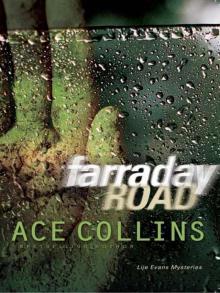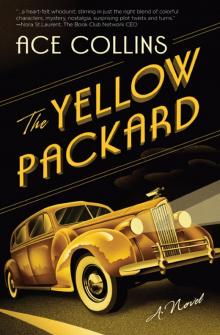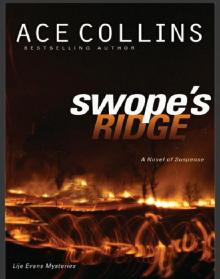- Home
- Ace Collins
Yellow Packard Page 9
Yellow Packard Read online
Page 9
The stranger was older than George, ill-kempt, and smelling of a mixture of alcohol and tobacco. His dark eyes were menacing, and as he opened his mouth to speak, George could see that his teeth were stained.
“How much?” the man growled.
George pulled Rose closer to his side, trying to shield her from the man’s glare, before answering. “We found a few hundred-dollar bills.”
There was an awkward silence for a few moments before the man grinned. “If it was anything more than a quarter, I ain’t lost it. Never had much in my whole life. Just haven’t been lucky.”
“I see,” a relieved George replied. “We’ll be on our way, then. And thank you.”
“Sure,” he replied with sly smile. “I know your face. You’re the guy with that yellow Packard? I’ve seen the ads in the magazines.”
“Yes, that’s our car and I’m that guy.”
“That’s a mighty fine ride.” The men laughed. “Mighty fine indeed.”
“Well, good luck,” George replied. “We need to be on our way. My wife will be home soon.”
George was in such a hurry to put the stranger behind him he all but dragged Rose down the walk. Though he didn’t look back, he felt the man’s eyes on him well after they’d turned the corner.
He’d seen lots of hoboes during the past few years. Scores of strangers walked the highways or hopped on trains. But there was something about this man’s eyes. They looked evil. And his voice had an edge to it that reminded him of the villains in horror films.
Later that night, after everyone had gone to bed, a strange, unsettling feeling kept George awake and finally pulled him out of bed. He wandered out to the garage and made sure the doors were locked and then walked through the house, checking the locks on each door and window. After finishing his mission, he glanced out through the front door and thought he spotted someone across the street standing by a tree. Stepping away from the window, George flipped off the lamp. When the room was completely dark he glanced out again. There was no one there.
Chapter 18
He’d dug through drawers and in chair cushions in his dilapidated three-room house and still couldn’t find very much money. He doubted the meager amount he’d uncovered would buy him the time he needed to fully explain the situation. Yet the information was too important not to make the call. Even though he wasn’t sure he had the coins he needed, he headed out into the night air and walked the five blocks out to the highway.
There were three pay phones he could use at this time of the night in Oakwood. One was in an all-night gas station. That place was always too crowded for privacy. Another was in the lobby of a travel court, but the owner was the town’s biggest gossip. So that was out. Thus, though it required the longest walk, he had to go to the garage out on the highway. He figured no one would be there, and they had a phone booth beside the station. That would work.
He was lucky. Dylon’s Garage was bathed in complete darkness. Except for a cat hiding under a bench in front of the office, not a living thing was visible. After taking a final look over his shoulder, the man stepped into the booth and slid the door closed. Pulling out his billfold, he found a slip of paper and set it on the tray under the phone. He studied the number for a moment before lighting a match so he had enough light to see and dropping a nickel into the machine and dialing a zero. After a woman picked up, he spat out a number and, before she could reply, growled, “I need to reverse these charges.”
“So this is a collect call?” the operator asked.
“That’s what I said.”
“And your name is?”
“Just give the party on the other end the initials—G. T.”
“That is ‘G’ like in general and ‘T’ like in truck.”
“Yep.”
“Just a moment please.”
“And who is it you want to speak with?”
“The guy who answers.”
“His name?”
“It doesn’t matter,” he barked. “The guy I want will be the other end. Just make the call. A front’s moving in, and it’s cold in this booth.”
“Yes, sir.”
The temperature had dropped twenty degrees since sunset, making it painfully obvious that winter wasn’t finished with Illinois just yet. As the shabbily dressed man shivered in the tiny booth, he glanced out toward the highway. Except for an occasional truck, the world had gone to sleep. That suited him just fine. He had little use for people any time of the day or night.
“Hello,” a sleepy voice grumbled into the phone.
“This is the operator. I have a collect call from a Mr. G. T.”
“What?”
“I said I have a collect call from a Mr. G. T.”
“Is this some kind of joke?” he barked.
“No sir, this is the operator, and I was instructed to place this call. Will you accept the charges?”
“No one would call me at this time of night. You must have the wrong number. So you call tell the caller to go to—”
“Operator, tell him the G. T. stands for Go To,” the man in the booth cut in.
“Sir, the party says that the G. T. stands for—”
“I heard him. Yeah, I’ll accept the charges.” The man waited until he heard the operator hang up before he snapped, “Thought I’d heard the last of you. You can’t pinch any more from me. I’ve given you the last dime you’re going to get. This well is dry!”
“I doubt that.”
“You’re even more stupid than I thought then,” he hissed. “I can’t believe I accepted these charges!”
The man in the booth allowed those words to grow as cold as the night wind before saying, “It seems some of the money might have turned up today.”
“What?”
“You heard me.”
“How much?”
“From what I can gather, a few hundred, maybe a bit more.”
“Where?”
“Beside a garage on Elm Street.”
Suddenly interested, the man on the far end of the call asked, “How?”
“I don’t know that yet, but I’ve got a theory. A good one, too! I’m not going to let you in on it right now. That will only come when we speak face-to-face.”
“I’ve got enough dirt on you to send you up for a long time,” the man warned.
“Shut up. I’ve got just as much on you, and you’ve got a lot more to lose.”
“So you actually know where it is?”
“It’s been right in front of us all the time. Yet I don’t think I can get my hands on it without a big diversion. You will have to help me carry off the plan. We need to meet very soon.”
“When and where?”
“I’ve got no wheels,” the man in the booth explained. “So you have to come here.”
“At your place?”
“No, in Danville. There’s a bar on State Street. It’s called the Lamplighter Tavern. Be there at three in the afternoon tomorrow. Not many folks there at that time.”
“This better be on the level.”
“It is.”
“So you going to be there?”
“I’m making it.”
“If you don’t, you’ll pay for it dearly!”
G. T. didn’t wait for a reply. Dropping the receiver back onto the hook, he slid the door open and stepped out into the harsh wind. The first few flakes of a March blizzard were swirling around his uncovered head. Shoving his hands deep into his pockets, he hunched his shoulders and retraced his steps back to the drafty rented house he called home. With any luck, his mailing address would soon be changing to a warmer climate. That day couldn’t come too soon.
Chapter 19
March 27, 1940
Carole’s first week at the store had been incredible. She’d been signed to do two weddings and was the designated flower shop for one of the largest funerals the community had seen in decades. Milt Bauer had been the state’s wealthiest farmer and one of the county’s most influential citizens. Everyone owed him
. Thus almost all the families in the region called in and ordered flowers. It seemed each caller wanted to have the most expensive spray there, and thus each new order made more than the previous one. The fact that a heavy snow had prevented many of the locals from being able to drive to Danville to pick arrangements had created even more sales for the little Oakwood business. Thus Carole, Rose, and the yellow Packard made scores of trips down the snowy streets from the flower shop to the Bacon Funeral Home.
On Monday morning at ten, things had finally slowed down. Carole and Rose had the store to themselves. Rose was playing with her dolls in a corner of the office that had been converted into a child’s activity center. There was a dollhouse, a half-dozen picture books, and some wooden building blocks all designed to keep the little girl occupied. Against the back wall was a small bed for afternoon naps, though so far the store had been far too busy with deliveries for Rose to be able to sleep. Most of the child’s naps had been in the backseat of the car.
As Rose played dress up with her Shirley Temple doll, Carole switched on the radio. After the local forecast, which called for clearing skies and above-freezing temperatures, the disc jockey announced, “‘When You Wish Upon A Star’ by the Glen Miller Orchestra.”
“That’s going to be a big hit, Rose,” Carole told her daughter as the song’s first few lines burst through the speaker. “Got a good message there, too. But you just remember, it’s not wishing, it is praying that works miracles.”
She looked at her daughter and smiled as Rose sang along with the tune. What a wonderful child she was. She was no trouble at all. She could pick up and go on a moment’s notice or play for hours without complaining while Carole worked. And she was so smart. She was already reading from first-grade primers. She was artistic, too. Her drawings looked like cats and dogs; they weren’t just scribbled lines. And on Saturday she had even helped Carole arrange flowers in the display case. The results were so impressive she’d left a few of Rose’s creations in place. Even if she and George never had another child, this one would be more than enough. She was simply so perfect Carole couldn’t imagine life without her.
A ringing phone pulled the woman from an order she was filling out and over to her desk.
“Carole’s Flowers.”
“Honey, it’s me.”
“George, I thought you had the day off and were going over to the park with Glen.”
“I did,” he assured her, “but I’m back now. Do you need any help? Want me to watch Rose for you?”
“No, you just rest. This is my first slow day. And believe it or not, I’m grateful for that. I can handle things here, and I think Rose likes playing in the shop. Guess it’s a case of like mother, like daughter. Besides, I just got her pigtails fixed. They look so cute and she’s so pretty, I want to show her off a bit.”
“Just like her mom,” George shot back. “Okay, I won’t bail you out. I’ve got a book I want to read anyway. If you need anything, just pick up the phone and let me know.” Just then the bell over the front door jangled.
“I will,” she shot back. “Got to go, someone just walked in. See you later.”
Carole put the phone down and glanced over to her daughter. “You just stay right there and play. Mommy will be back when I’m finished with this customer.”
Sweeping through the door that separated the office from the main part of the small store, she noted a heavyset man in a dark suit looking at a display of plastic yellow roses. His skin was clammy and in spite of the cool weather, there was a bit of sweat beading on his brow.
“May I help you?”
“Perhaps,” came his carefully measured reply. “That’s a great song you got playing on your radio.”
“I can turn it down if it is too loud. My daughter and I love it.”
“No, I like it, too,” he assured her, “but I didn’t come in about the music. I spotted something through the window that kind of interested me.”
“A flower?”
“No, a piece of furniture.”
“We don’t sell furniture,” Carole apologized, “just flowers.”
“But that rolltop desk over in the corner of the room. The one you have the card displays setting on. That is a nice piece.”
Carole’s eyes darted to the oak desk. “The former owner of this store got that at a sale a few years back. She is just storing it here until it can be shipped out to California. That’s where she lives now. I can’t sell it, but if the price was right she might. Going to be a lot of trouble to move a few thousand miles. I could write her a letter if you want to offer a price.”
“Yes,” he said, his gloved hand tracing the upper of his three chins. Walking over to the desk, he lightly rapped on the top. “It’s solid. The finish is in good shape, too! Does the rolltop work?”
“I don’t know,” she admitted. “We can see.” Reaching the handle, she slowly pulled it down. Stubbornly at first, the top moved. A second, harder pull moved it through the carved channels and down to the top of the desk’s work area.
“It’s noisy, but it works.”
“You’re right about that noisy part,” he quipped. “I couldn’t even hear the radio playing when you pulled it down. Let me try it.” He pushed it up, and as soon as it got to the top he yanked it down. He continued the up-and-down exercise a half-dozen more times until Carole reached down and put her hand on his to stop him.
“Please, if you keep doing that you’re going to give me a powerful headache, and I didn’t bring any powders to work with me today.”
He glanced past her to the front window and smiled. “The desk isn’t really as large as I thought anyway. But I would like to buy some of those red carnations that you have in the window. Could I purchase a half a dozen?”
“Sure. Do you want them in a vase?”
“No, a box will be fine.”
“I’ll get them for you.”
As Carole retrieved and counted the carnations, her customer stood beside the counter and observed the quiet, unhurried traffic passing by the shop. As much to make time pass as to create conversation, she called out, “Not much happening this time of the day in our small town. Where are you from?”
“Chicago.”
“You here on business?”
“Just passing through,” he explained.
Carole pushed the lid down onto the box and tied a piece of twine to secure it. She pushed it across the counter as she announced, “That will be two twenty-five.”
The visitor reached into his pocket and produced two ones, setting them beside the box, before separating three nickels and a dime from his change with his gloved hand. Placing the coins in her hand, he thanked her, picked up the box, and headed toward the door. As he stopped outside, Tommy Dorsey’s “All the Things You Are” came on the radio.
“The station’s playing some great music today, aren’t they, Rose?”
The little girl didn’t answer. Must have fallen asleep, Carole thought. Probably completely worn out from last week. Moving quietly back through the door to the office, she peeked around toward the play area. Rose wasn’t there. She wasn’t in bed either. In fact, she was nowhere in the room.
“Rose,” she called out frantically. “Rose, where are you?”
There was no answer.
She raced over to the back door. Though they rarely used it, maybe her daughter had decided to go out into the backyard area to play. The fact that it was slightly ajar gave Carole a measure of hope. Yanking it open, she glanced out into the snow-covered yard. There were no small footprints, but there was a set of large ones both coming and going, and the back gate, which was never used, was open. Carole’s heart began to race. Where was she?
Maybe George came and got her, she reasoned. Racing back into the office, she hurriedly called home. One ring, two, three, and finally a fourth!
“Hello.”
“Honey, it’s me, did you come and get Rose?”
“No,” came the groggy reply. “I tried to read some, but I
must have fallen asleep on the couch.”
“Nooooo!” She cried. “Oh, Lord, no!”
“What’s wrong?”
“George, she’s gone.”
“What?” He now sounded fully awake.
That’s when she saw it—the note sitting in the middle of her desk. It looked like a child’s art project. Letters had been cut out and glued to a white piece of paper. The message was clear.
“She’s been kidnapped,” Carole whispered into the receiver.
“What?” George shouted. “How can you be sure?”
“I’ve got the note in my hands. It says, ‘I have your kid. Don’t call the cops or she dies. Get $5,000 in small bills. Will call with instructions.’ George, what are we going to do?”
“Don’t move. I’ll be right there.”
Chapter 20
George sprinted the eight blocks from their home to the flower shop. He rushed through the front door, leaving it wide open. A quick survey assured him Carole was in the back. Five quick steps took him to the office. She was standing over her daughter’s dollhouse, her chest heaving, tears rolling down her cheeks and dropping to the floor.
“Carole!”
She slowly turned to face her husband. Her eyes were already red, her face drawn, and her mouth quivering. She tried to form words, but her lips only made it through a single syllable, “Why?”
George had no answer. And as much as he felt called to throw his arms around Carole and try to soothe her fears, a greater calling demanded his attention. Rose was gone, and it was his job as a father to bring her back.
“Where’s the note?”
Carole pointed to the desk. Spotting it, George quickly read through the very simple message. They were going to have to wait to get further instructions. But when would they come?
“We need to call the police,” she whispered, moving toward the phone.
“No!” he shouted while catching her hand and gripping it tightly enough that she flinched in pain. “I’m sorry,” he said, in a much lower tone as he released his grip. “But we can’t. If we do they might kill her.”

 Stories Behind the Best-Loved Songs of Christmas
Stories Behind the Best-Loved Songs of Christmas Farraday Road
Farraday Road Yellow Packard
Yellow Packard Swope's Ridge
Swope's Ridge Darkness Before Dawn
Darkness Before Dawn